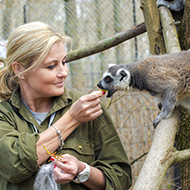Zoo culture influences keeper-animal attachment

"Understanding what impacts keeper-animal relationships is essential" - Professor Vicky Melfi.
Hartpury University's Animal and Agricultural Research Centre has discovered that zoo culture has an influence on the strength of keeper-animal attachment.
Researchers at the university explored levels of animal attachment among zookeepers using the Lexington Attachment to Pets Scale (LAPS). Using data from 180 keepers, researchers found that the keeper's scores regarding their own pets were comparable with the general public, however, the keeper's scores regarding the zoo animals in their care varied significantly by institution.
The variation between scores in different institutions suggests that the culture of each zoo influences the level of attachment between keeper and zoo animal, and this study is the first time zoo culture has been identified.
Published in Zoo Biology, the study also found that the zoo animal attachment LAPS scores were higher in women than men, and no difference in attachment was found between species.
Professor Vicky Melfi, who led the research, explained the importance of the work: “Understanding what impacts keeper-animal relationships is essential, as they impact animal and human wellbeing, as well as the safety of the keepers themselves.
“By understanding what affects the relationship between keepers and their animals, collections can actively work to improve the welfare and wellbeing of the animals in their care while also improving overall job satisfaction among keepers.”



 The Animal and Plant Health Agency (APHA) has updated its online reporting service for dead wild birds.
The Animal and Plant Health Agency (APHA) has updated its online reporting service for dead wild birds.